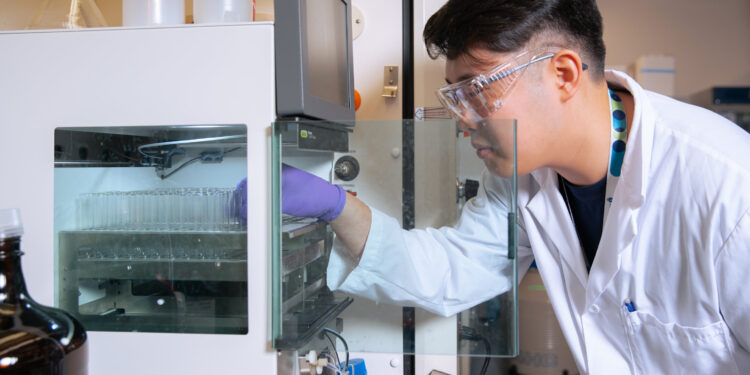A team of researchers based at the Leslie Dan Faculty of Pharmacy at the University of Toronto (U of T) has discovered a novel ionizable lipid nanoparticle, iso-A11B5C1, that enables muscle-targeted mRNA delivery while minimizing off-target delivery to other tissues. Credit: Steve Southon, University of Toronto
A team of researchers based at the Leslie Dan Faculty of Pharmacy at the University of Toronto (U of T) has discovered a novel ionizable lipid nanoparticle that enables muscle-focused mRNA delivery while minimizing off-target delivery to muscles. other fabrics. The team also showed that mRNA delivered by the lipid nanoparticles investigated in their study triggered powerful immune responses at the cellular level as a proof-of-concept melanoma cancer vaccine.
The study, led by Bowen Li, an assistant professor at the Leslie Dan Faculty of Pharmacy at the University of Toronto, was published this week in Proceedings of the National Academy of Sciences.
Called iso-A11B5C1, the novel lipid nanoparticle demonstrates exceptional mRNA delivery efficiency into muscle tissue while also minimizing unintended mRNA translation in organs such as the liver and spleen.
Additionally, study results show that intramuscular administration of mRNA formulated with this nanoparticle elicited potent cellular immune responses, even with limited expression observed in lymph nodes.
“Our study shows for the first time that mRNA lipid nanoparticles can still effectively stimulate a cellular immune response and produce robust antitumor effects, even without direct targeting or transfection of lymph nodes,” said Li. “This finding calls into question challenges conventional understandings and suggests that high transfection efficiency in immune cells may not be the only route to the development of effective mRNA vaccines against cancer.”
Reducing off-target effects is an essential step to increasing the safety of potential therapies
Lipid nanoparticles, also known as LNPs, are key to delivering mRNA-based therapeutics, including the COVID-19 mRNA vaccines that have been used worldwide during the recent global pandemic. However, many LNP designs can inadvertently result in substantial mRNA expression in off-target tissues and organs, such as the liver or heart, thereby leading to often treatable but undesirable side effects.
The drive to improve the safety of mRNA therapies that have the potential to treat a wide range of diseases means there is an urgent need for LNPs designed to minimize these off-target effects, says Li, who is also a recent recipient of the Gairdner Early Career Scholar Award.
The new research shows that, compared to the current reference LNP developed by Massachusetts-based biotechnology company Moderna, iso-A11B5C1 demonstrated a high level of muscle-specific mRNA delivery efficiency. It also triggered a different type of immune response than seen in vaccines used to treat infectious diseases.
“Interestingly, iso-A11B5C1 elicited a weaker humoral immune response, generally central to current antibody-driven vaccines, but still elicited a comparable cellular immune response. This discovery led our team to further explore this as a potential cancer vaccine candidate in a melanoma model. , where cellular immunity plays a central role,” Li said.
The interdisciplinary research team that conducted the study includes Jingan Chen, a Ph.D. intern at the University of Toronto’s Institute of Biomedical Engineering, and Yue Xu, a postdoctoral researcher in the Li lab and a research associate at PRiME, the University of Toronto’s inter-institutional precision medicine initiative.
“Although iso-A11B5C1 showed limited ability to trigger humoral immunity, it effectively initiated cellular immune responses by intramuscular injection,” Chen said. “The substantial antitumor effects observed with iso-A11B5C1 highlight its promise as a viable candidate for cancer vaccine development.”
New platform enables faster, more precise lipid design
The research team identified iso-A11B5C1 using an advanced platform developed to rapidly create a range of chemically diverse lipids for further testing. This platform, newly introduced in the study, overcomes several challenges observed in previous research by streamlining the process of creating ionizable lipids that have high potential to be translated into therapies.
By rapidly combining three different functional groups, hundreds or even thousands of chemically diverse ionizable lipids can be synthesized in 12 hours. “Here we report a powerful strategy to synthesize ionizable liquids in a single-step chemical reaction,” Xu said. “This platform provides new information that could help guide lipid design and evaluation processes in the future and allows the field to address the challenges of RNA delivery with a new level of speed, precision and insight. »
More information:
Jingan Chen et al, Combinatorial design of ionizable lipid nanoparticles for selective mRNA delivery into muscles with minimized off-target effects, Proceedings of the National Academy of Sciences (2023). DOI: 10.1073/pnas.2309472120
Provided by University of Toronto — Leslie Dan Faculty of Pharmacy
Quote: Researchers discover new lipid nanoparticles that show muscle-specific mRNA delivery and reduce off-target effects. (December 8, 2023) retrieved December 9, 2023 from
This document is subject to copyright. Except for fair use for private study or research purposes, no part may be reproduced without written permission. The content is provided for information only.



